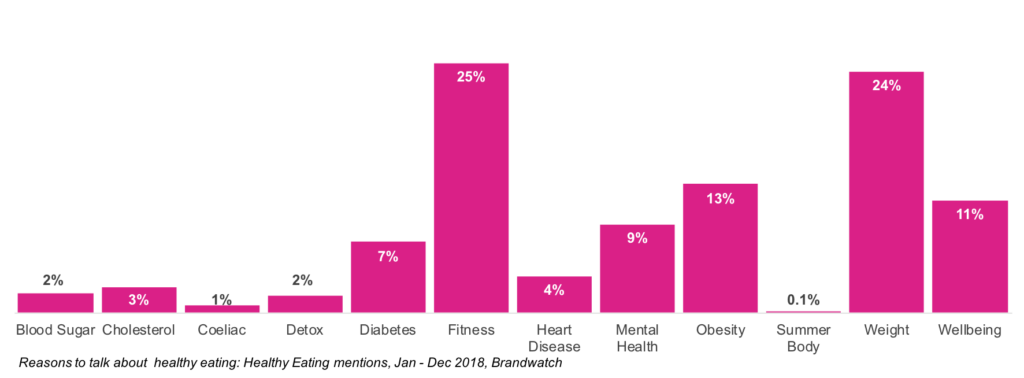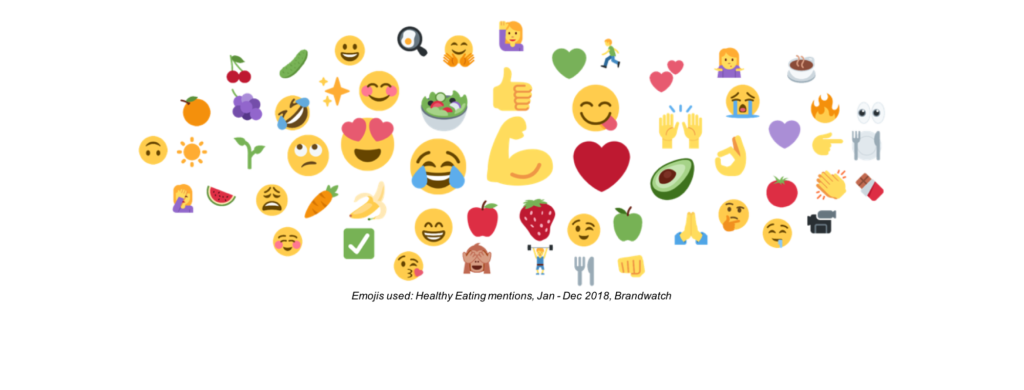February 12, 2019
High performing social content is relevant to its audience. That’s why it does well. We know that. It’s a fact.
The bit that is difficult, is working out what is likely to resonate. Particularly when you’re in a category that just doesn’t see quite as many trends as others. What do you do when no one topic or interest stands out enough to give you the hook you need to develop a robust content plan? How do you find the focus that stops you dashing from one mini-topic to another, or being so vanilla you make no impact at all?
Our latest report looks at the social mentions of healthy eating. You’d think the data would be rife with trends from avocados to insta food porn. Well no, not really. Every food, topic and idea is covered. So much so that there are very few significant and sustained trends on which to hang your themes and content plans on. You would end up creating lots and lots of tiny bits of content that would achieve minimal stand-out.
Instead of looking at the main topics, you should consider the language and behaviours that surround the conversations on healthy eating. They give you pointers on how to tailor your posts, so they connect with your audience and inspire action – whether that is a like, a link click, or a purchase. Here’s how:
Motivations mean associations
Instead of focusing on the food, focus on the reasons why a person is talking about healthy eating. In fact, over 50% of healthy eating conversations give an indication as to the motivations for healthy eating.
By far the most important are fitness and weight. Wellbeing and mental health play a part too. Not a surprise given that there’s been a high level of interest in this topic across 2018/19.
Understanding these motivations enables you to sketch out your shopper missions. To understand what drives someone to buy healthy foods (or associated products). Armed with distinct shopper missions, you’re able to craft relevant messaging, and framework the pillars to guide your content in social throughout the year.
Mirror match emotions
Eating is an emotional subject. Good content will mirror and match these feelings. What are the stresses, what do they love and how do they feel? These are important ways to get into the psyche of your audiences.
When pulling out all the posts that expressed emotions (29% of all posts), happier emotions lead the way. 27% mention love, 17% happy and 18% enjoy. That’s a lot of good emotions!
Vegans are even happier. And not just vegans. But those on specific diets including pescatarian, vegetarian and flexitarian are all much happier. Generally, it seems healthy eating maybe a challenge, but people love to do it.
For brands, there’s an opportunity to mirror and match the sentiment and the language. If you’re targeting those with specialist diets, it’s worth using positive hashtags alongside the love and happiness conversations. It’s a way to align your content tone with that of your audience – and it’s a good way to resonate with the healthy eating fans.
Pictures and words
It isn’t just about the underlying tone or in understanding behaviours and motivations that will help you get closer to your audience. So too will look and feel. Pictures matter. It might be healthy, but food and fitness is driven by the artistic and beautiful on social.
In your copy, the visuals play a part too.
The emoji is loved by those talking healthy eating. There are lots of expressions of love and happiness. And strong emojis like the flexed bicep feature heavily too, playing into the willpower and the fitness conversations. When it comes to fruit and veg emojis, the salad bowl and avocado are most popular. Not many aubergines though!
So, when your topics are scattered and diverse, thread them together under motivations, bring in resonance with your audience by mirroring their emotions and matching the visual style.
The above is only three elements of good content planning when faced with no one topic to focus on. It will make a significant difference to your always-on content and allow you to stand for something, be recognised and most importantly, be relevant to the healthy eating audience.
Oh! By the way, you can download the whole report for free at https://po.st/HealthyEats


